Introduction
The UN internship. That coveted breakthrough. International job exposure at last. The passageway to work (finally, paid) after school. And to a never-ending carousel of success in life.
There may be no other internship experience in the world on which so much hangs.
But is it all these things?
If all UN interns go on to become UN Secretariat staff, at most 11% of staff would have UN-specific internship experience early in their careers. This means:
- A clear majority of staff cut their teeth elsewhere, and despite the lack of UN internship, clawed their way up the career ladder.
- But of course, not all UN interns become staff, so the share of UN staff that went through a career path of UN internship to paid position is likely much, much smaller than 11%.
The trouble is that job-seekers are at a loss for pathways into UN or global development work.
And in this, the UN internship does not follow typical patterns.
In other sectors, internships are increasingly the first step in a so-called white-collar career, as a 2014 Economist article noted. With over 30,000 interns expected in any given year among the “Big Four” audit companies, 6,000 unpaid interns working for the United States Congress, and 3,000 at Google alone, it’s a path in many sectors to a paid job after graduation from university.
But the UN job market differs.
Here is the paradox: UN internship experience is not counted towards the years of experience required to qualify for UN staff positions. That’s right, the UN itself does not count UN internship experience as part of its staff hiring process.
This said, the UN internship remains a useful experience for many in their academic and professional careers. It can open doors to other development organizations or companies within the private sector and it can help you determine whether a life of impact is for you. I undertook one and learned a lot about the organization, the issues I worked on and myself.
And while full staff appointments are harder and harder to come by, it’s certainly true that many UN interns go on to have strong careers as consultants working for various UN entities. Indeed, with over 65,000 consultants and individual contractors providing services to the UN system, they outnumber staff appointments across most UN agencies, funds and programs.
This Ultimate Guide takes a behind-the-scenes look at internship opportunities at the UN: their trends and availability, what people say about their experiences, and how to go about finding an internship (or how to make one for yourself). The Guide will help you decide whether pursuing a UN internship is for you—and if so, how to get your foot in the international development door.
But first, who died and made me intern king?
Who might I be, you ask? Let me start with who I’m not.
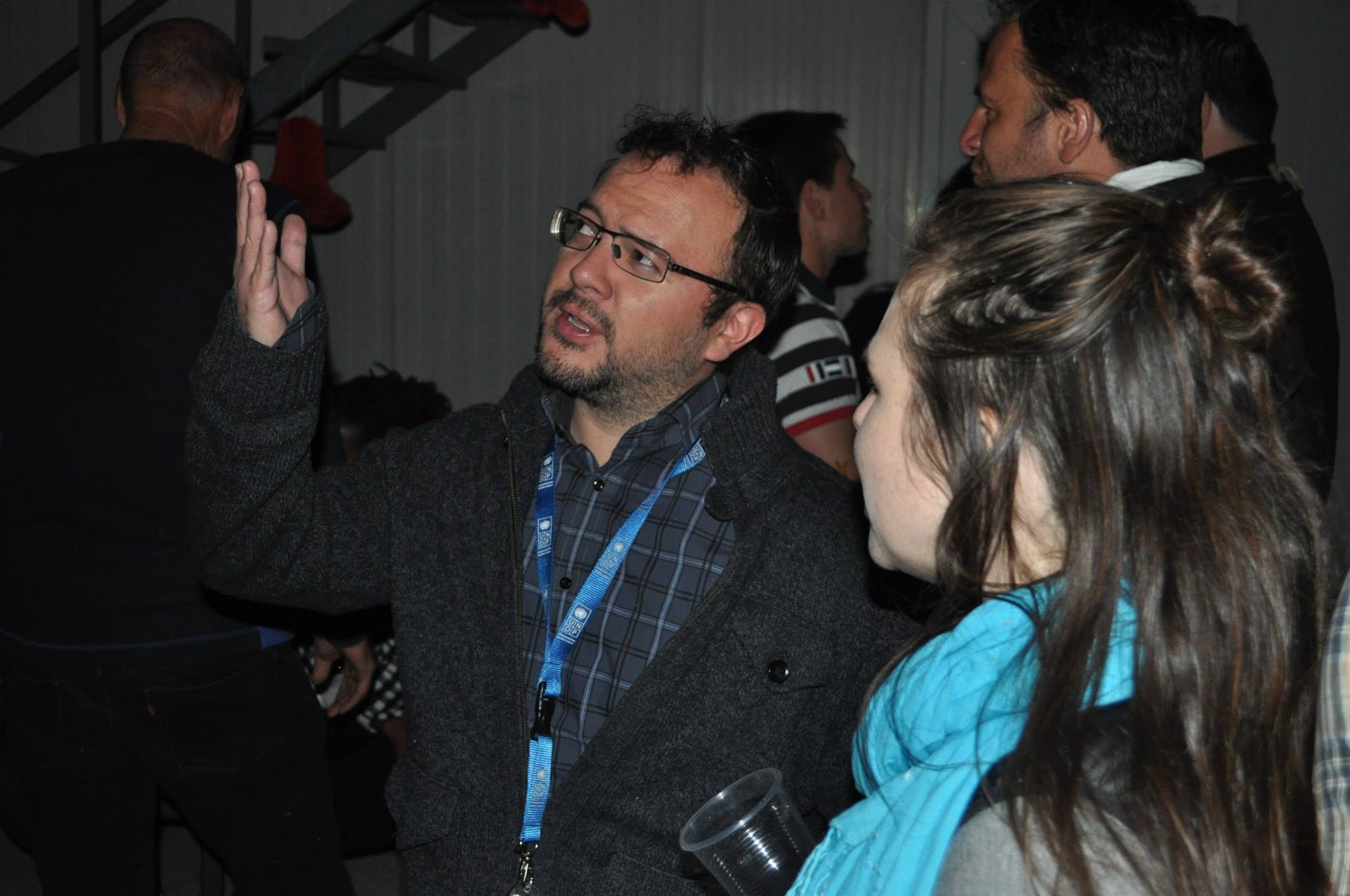
Me mansplaining something in Afghanistan.
First and foremost, I’m NOT in any form or fashion a representative of UN policies, regulations, or thoughts, on internships or anything else for that matter. While what I share here is based on an on-going 15-year career working with various parts of the UN system, I do not speak for any UN entity or personnel.
I’m NOT former HR either. In UN organizations, HR supports the hiring process, making sure policies are met fairly and transparently. I AM a former hiring manager at the UN (at the Director-level) who made the final call on who gets interviewed and who gets hired.
I’m NOT a recruiter. Recruiters must specialize in something, but it’s not international development. I AM a certified development expert (go ahead, Google me) who learned what works and what does NOT work in finding jobs over many successes and failures.
I’m NOT someone who got just one internship or short-term consultancy. I’ve interviewed for dozens of jobs and been everything from permanent staff to 30-day consultant (with LOTS of shades in between). I’ve read thousands of applications, been on interview panels for dozens of internship, consultancy and staff appointments—and seen countless hiring situations unfold.
Yes, I once was a UN intern. Way back in the summer of ‘06. I remember it well. The air was gaudy. The scene: tryst. We discussed the limitations of the gravity model of trade and the way Doi Moi policies affect women in Vietnam over repeated cups of Thai iced tea… Ok, maybe not. But yes: I interned for the UN regional commission in Asia-Pacific in Bangkok. I applied like everyone does. Went unpaid in a foreign land like everybody. And like most… went broke afterwards.
I did NOT network my way into development. Network, network, network. That seems to be the solution everyone tells you about. It explains why you haven’t heard back from any of those internship or job applications, right? You MUST not know the right people. If only it were that simple. What they’re not telling you is, every major organization MUST advertise openings by policy. So even if you know the actual hiring manager, there is no guarantee like putting in the real and hard work to get that internship.
You can find out more about me here.
With that out of the way – let’s get on with it.
So, why UN internship?
Many great hopes hang on a UN internship, they usually fall into 5 categories.
- Get a UN or top development-world job as a direct result of your internship.
- Gain relevant experience to draw on in future job applications, at the UN or elsewhere.
- Meet people to grow your ‘network’ to draw on in future job applications.
- Work in a multicultural, international environment committed to ending global poverty.
- Apply your education and bring internship learning back into your academic coursework.
If your interests lie in at least 2 of these buckets, it can be a rewarding experience.
Because the Internet is filled with a lot of ambitious people with moral passion, let’s be clear on one thing. The United Nations is a professional organization. Meaning it demands a specific set of skills, knowledge and abilities across all its work.
Now, how well it meets these demands is surely debatable. Yes, it aims to better the human development of all people, everywhere.
But as was inevitable, the UN overtime developed a bureaucracy required – in one fashion or other – for the systematization of work to support governments, communities and people in achieving progress.
This all to say: the UN does not owe you or anyone an internship.
No matter the scale of your desire to do-good. To contribute to humanity. Or your self-sacrifice to not go down the path of private law practice, finance or medicine, where you could make a much better living. The UN requires certain skills—and you’re competing with tens of thousands in the world for very few spots.
It would be lovely if everyone with the desire and basic background could experience an international office like those available in UN buildings round the world.
But there are practical realities to getting into, succeeding and expanding your impact in global development—and the more we’re aware of them, the better we can use them to our advantage.
Four universal facts
All UN internships have four universal facts:
- Fundamental fact #1: You must be enrolled in a graduate degree (Master’s or PhD).
- Fundamental fact #2: They are unpaid.
- Fundamental fact #3: You must speak English and/or French.
- Fundamental fact #4: Your internship experience is highly contingent on both who you work with, and on other interns.
Three exceptions exist — and there is a slow evolution towards the better.
One throws salt in the wounds of many: if your parent works for the UN, then your internship can be paid. But note: This stands for UN staff that work outside of the UN Secretariat—if you’re a child or sibling of a UN Secretariat staff, you cannot become an Intern within the divisions of the Secretariat. (Confused? Read-on, I’ll clarify more.)
The other exception is that the International Labor Organization (ILO) provides interns a stipend (as it rightly would, no?).
And in 2018, the World Health Organization (WHO) committed to pay its interns by 2020, and to ensure that 50% of interns come from developing countries by 2022.
A brief history in time of “gratis personnel”
Interns in UN parlance are “gratis personnel”—which makes it sound fancy as the UN would do, but it underscores fundamental fact #2 of UN internships: gratis = no pay. It’s noteworthy that UN documentation uses this phrase to describe interns.
Now, what might the patterns and trends of gratis personnel opportunities in recent years look like? In short, the masses of interns have skyrocketed.
The earliest data available show the UN Secretariat* had the grand total of 131 interns in 1996. In the latest biennial report for the 2014-2015 period, the Secretariat had 4,475 gratis personnel.
Numbers of interns have gone through the roof
Fair warning: The following gets wonky. But you’re interested in the UN, right? It comes with the territory.
The earliest documented review of UN Secretariat* internships comes in the form of document A/51/688, a Report submitted to the 51st session of the General Assembly in 1996. The year is important context, as the situation of the use of unpaid interns in peacekeeping operations at that time raised concerns on the role, functions and accountability of interns.
The Report expressed concern with DPO’s use of interns in the place of staff resources. It goes on to conclude with a call for UN Member States to ensure “the necessary staffing resources to implement UN programmes and activities as decided upon by legislative bodies”. In other words, unpaid interns should not be carrying staff responsibilities.
A/51/688 puts into sharp focus the financial challenge of staffing the UN’s work. Funding shortfalls led to the use of gratis personnel that wound up in the call for more systematic review of UN’s interns’ work, greater regulation, and reporting.
This is a problem the plagues the system to this day.
Then, in February 2003, the General Assembly requested reporting on the management of the employment of gratis personnel on a biennial basis to include information on: nationality, duration, and functions.
These biennial reports give us an understanding of the scale and trend of UN internships over time:
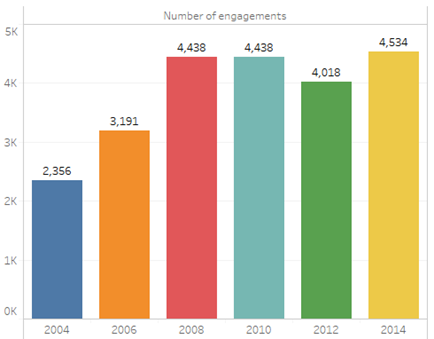
Note: Prepare for wonkiness: these Reports look at “engagements” as well as numbers of gratis personnel—meaning that they will generally be close but are not exact, as one person may be engaged more than once. In other words, it happens that a fair number of interns intern again. (Please note as well for ease of presentation, the time ranges are actually two-year periods: 2004-2005, 2006-2007, 2008-2009, 2010-2011, 2012-2012, and the latest year reported, 2014-2015.)
I’m not sure what led to the sizable increases in 2008-2009 or the drop in the 2012-2013 periods, but they are interesting. My best guess for 2008-2009 is that the financial crisis hit things hard and both supply of internship interest and demand dramatically increased. For 2012-2013: ???
The pre-2003 reports used to note quarterly intern data, with the year 2000 holding a complete year’s record. It is old, but I suspect this pattern still holds true:
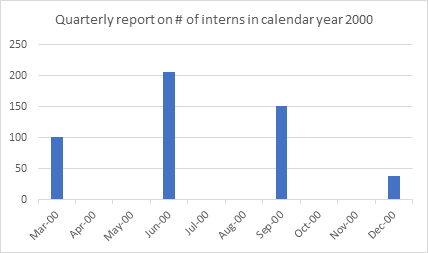
The key insight here is that numbers of interns drop significantly in winter and spring quarters, and spike in the summer. This could be useful to inform your UN internship search strategy.
Two additional observations may be noteworthy from the UN gratis personnel documentation.
- Whither quarterly reports? Prior to the February 2003 resolution, there were several years of quarterly reporting. In those reports, you can find the names of the internship donating Member States. (Belgium, Germany, and South Korea often appear.) These turned into the biennial reports after 2003, due to the adoption of changes that increased regulation.
- Extraordinary work requests. In the late 1990s, you find a set of formal requests to use interns in the political work surrounding the International Criminal Court on the Former Yugoslavia, and in the Department of Peacekeeping Operations. This flies in the face of other regulations preventing interns from holding what would normally be staff responsibilities. While in many ways the world has never known such a sluggish bureaucracy as when nations come together to decide stuff, the UN’s rules and regulations even covering gratis personnel are inherently flexible. They can be rewritten based on agreement of Member States, adapted to new situations.
Ok so that’s what you’ll find out about the general scope and patterns of UN internships, with a few highlights that can help inform your UN internship search strategy.
But which agencies are the most popular, you ask?
Good thing, because that’s where we’re turning to next.
Top 10 UN agencies that hire interns
UN reporting on interns leaves some room for improvement, although as someone who has worked on collecting internal UN system data, I’m sure collecting this information is no easy task. But the available information does give a sense of where the opportunities exist—and where your toughest competition may be.
Here’s how it breaks down.
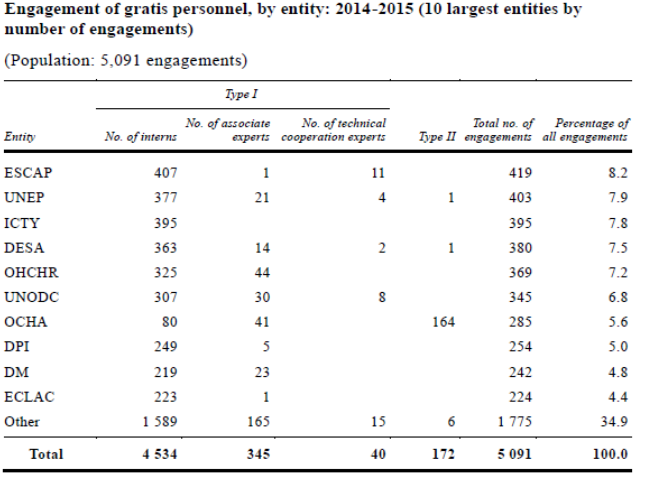
Two of the 5 Regional Commissions (ESCAP and ECLAC) combine for over 12% of all internship engagements in the most recent period with data. And entities directly working on human rights issues (ICTY and OHCHR) constitute 15% of engagements.
The “Other” category holds the largest share of interns at well over a third of all engagements but sheds little light on which of the other entities have the most opportunities. What I would assume, though, is that the 1,589 interns are distributed in small numbers in the other UN entities.
Finally, let’s not forget the reporting covers a two-year period (1 January 2014 to 31 December 2015). On average, we’re looking at about 2,200 opportunities being available in any given year.
Note: “Type I” is what the UN classifies as “intern” in the classical sense. “Type II” are gratis personnel seconded by Governments or others responsible for their pay. Type II fill-in gaps of expertise or urgent assistance. Type II may be an equally good way to get your foot in the door, but are likely much more competitive, with only 172 of these good folk around from the latest period. OCHA seems to have dominated Type II personnel given humanitarian events.
Below is a more detailed break-down. We’ll return to this but consider for now: (a) Where your professional interests lie in terms of which agency performs work in that area; (b) which agency has the most competition, which the least; (c) where women or men may be underrepresented.


A word about the UN organizational structure since we’re here
Remember when I asked if you were confused about the rules on UN payment of interns for children or siblings of UN staff? Well, it all depends on what part of the UN we’re referring to.
To many, the “UN” is discussed as a single institution. It actually consists of more than 30 separate agencies, research institutes and entities. We can say that when we speak of the “UN” we mean the entire system, including the agencies, funds and programs like UNDP, FAO and UNICEF. But from experience, people often also only mean what is the UN Secretariat—those parts directly governed by the UN Secretary-General.
In this Ultimate Guide, I use the broader “UN system” meaning.
The distinction is important to be clear on, as each entity has distinct internship opportunities.
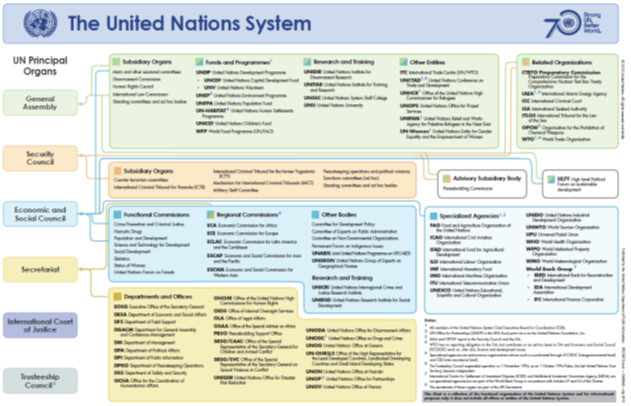
Pro-Tip: This Wikipedia page is helpful if you want to base your search strategy by location.
Who are UN interns?
Online forums are rife with discussion about the under-representation of developing country citizens among UN interns. But it’s always helpful to assess actual data—which may have surprising findings for some.
Yes, there is disparity, with 14 of the Top 20 countries in terms of numbers of interns at the UN in the 2014-2015 period being in Western Europe, North America, Russia and Australia.
But China coming in with the largest number of interns on its own – with more than the bottom 7 countries in the top 20 combined – goes in the face of common belief on the structure of UN internship participation. Kenya being in the top 5, and Chile, India, Lebanon and Brazil in the top 20 are also noteworthy.
| Rank | Country | Number of interns | Percentage of total |
| 1 | China | 517 | 11% |
| 2 | United States of America | 434 | 10% |
| 3 | France | 314 | 7% |
| 4 | Kenya | 278 | 6% |
| 5 | Germany | 226 | 5% |
| 6 | Italy | 174 | 4% |
| 7 | Canada | 167 | 4% |
| 8 | Republic of Korea | 159 | 4% |
| 9 | United Kingdom | 140 | 3% |
| 10 | Russian Federation | 135 | 3% |
| 11 | Australia | 133 | 3% |
| 12 | Chile | 107 | 2% |
| 13 | Spain | 102 | 2% |
| 14 | India | 93 | 2% |
| 15 | Austria | 72 | 2% |
| 16 | Lebanon | 65 | 1% |
| 17 | Brazil | 61 | 1% |
| 18 | Netherlands | 58 | 1% |
| 19 | Sweden | 56 | 1% |
| 20 | Switzerland | 55 | 1% |
UN interns hailed from some 149 UN countries in the 2014-2015 period, a wide representation of the 193 UN Member States.
Yet, it is only up to the country ranked at 60th that the number of interns figure in the double digits, with Ethiopia occupying that position with 10 interns. After this, 89 countries have just 1 intern at the UN in 2014 or 2015.
And between men and women, who is more strongly represented? UN interns are mostly women, at 67% female.
What UN interns say: the good, the bad, the ugly
So, is a UN internship for you? It’s good to keep a clear eye on the subject. And there’s probably no better way to do that than to see what interns themselves have said online.
Glassdoor.com is one incredibly useful place. Here’s a snapshot of the Pros and Cons as stated by former interns themselves.

The big pluses are those you would expect from a close encounter with the UN:
- Multicultural experience.
- Working with smart, committed people.
- Indications of generally friendly work environments.
The drawbacks are primarily noted as:
- No pay.
- Small chance of fulltime, paid employment.
Where to find them
There are two types of paths to a UN internship:
- Structured.
- Unstructured.
Structured
Most UN internships can be found on respective agency websites. They follow a typical pattern and annual cycle. They will consist of:
- Seasonal hires.
- Regularly hired thematic areas.
- Locations invariably in: New York, Geneva, Bangkok, Nairobi.
There is little choice for structured opportunities but to apply and compete.
The official site has gotten pretty good since my days scouring the web for a UN internship:
Unstructured
A second class of structured internships are emerging which are slightly more on-demand. And these will typically be out in the field.For instance in mid-April 2018 I saw this opportunity pop-up:
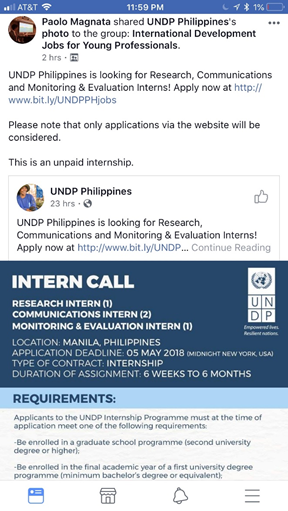
UN internships are essentially free labor. And because of this, many UN staff can be persuaded that they simply have missed the chance to lighten their own workload by having you on-board.
The paperwork to create a UN internship where none previously existed is nothing to sneeze at: but the mountain is smaller than doing the work yourself.
This means you can find a team where you’re bringing a particular skillset. And in whose work you’re especially passionate about. Write them a very persuasive email.
And create your own internship.
Your application material
Structured or unstructured, you have to write an application that STANDS OUT.
Sadly, it’s not the responsibility of the UN to hire YOU, but it IS yours to stand out to them.
Things that make potential interns stand out in a positive way:
- Unique experiences.
- Powerful ‘origin’ stories.
- Ridiculously high GPAs.
- Highly relevant coursework.
- Personality fit.
Things that make potential interns stand out in a negative way:
- Arrogance.
- Lack of self-awareness.
- Pushy.
- Relying on who you know only.
Bear in mind, the person reviewing applications will likely be looking for reasons to “X” you out, rather than keep you in. There are just too many applicants.
Don’t give them any reason to automatically pile you into the “no” list.
How to follow-through with your application
Whether you’re going the traditional structured route or the unstructured entrepreneurial one: reach out to the hiring people.
Find points of commonality, make a connection, follow-through. And keep track of the conversation.
Notice I said: “follow-through”—not “follow-up.” Framing your work as “follow-up” makes it tedious and a chore to email someone for the 3rd time after two no responses, and this will come through in your messaging. When you follow-through: you learn from what is working or not in your outreach, apply it to enhance your reach-out to the next person—and when you succeed, you follow-through with the connection.
There will be three types of reach-out situations:
- Cold leads. This is where they have no clue who you are. Whatever you do, don’t ask them for that internship! Find someone working in the division or team you’re interested in. Write them a message on LinkedIn to ask them about their organization’s work; retweet in a truly interesting way their latest post on Twitter and add a good comment that edges debate forward; leave thoughtful comments on their blog. Make them notice you to start an engagement and move on to make them a…
- Warm lead. You may be on their radar now. You may have an alumni connection, share a love for Real Madrid or the person is a friend of a friend. Build on this common point and approach the connection for concrete, practical advice. Then do what? You guessed it. Follow-through on what they advise you to do. Then they will become a…
- Hot lead. Only after a series of getting-to-know-one another engagements do you casually ask if you can help them in their work or if they know of anyone looking for professional support in the area of expertise you’ve now shown them you have.
What to expect on the job
There is no universal experience.
In my UN internship, I worked on everything from a literature review on the role of gender in international trade, compiled data to run a gravity model of trade, and led a team of other interns to produce a communications brochure. I did the internship for about 3-months full-time.
That is about the average length of a UN internship:
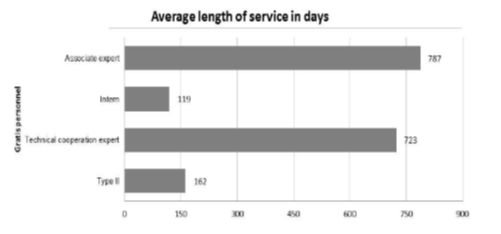
But I also took a break in the middle of the program. While during the internship, I became friends with a consultant who was also a former Canadian volunteer in Thailand. Annually, this group gathers together for a week to study a specific issue. I was allowed to tag-along for this 1 week, so I took a break from my internship to travel. Typically, there’s this kind of flexibility.
I have seen several interns get very frustrated though with their internships. For one, they hold ultra-high expectations. This tends to be that their experience will be very well-structured, with regular feedback with their supervisor and organized opportunities to meet with other interns and staff.
This rarely is the case. Most UN staff tend to be overburdened, stressed and overworked. Interns are hired usually to help solve these issues, not to add to them. I’m not saying this is right, but it’s the reality.
In several HQ cities, though, interns have self-organized. Like how most progress happens in the world, they coordinate after-work drinks with other interns. Keats on 2nd Avenue between 44th and 45th St in New York City typically has one event or other with NY-based interns, for instance.
Another way interns get frustrated is the pressures of going unpaid for 3 months (or more) catch up with them.
As a whole, the best experiences are those that balance expectations with reality. And like most things in life, it’s up to you to make of it what you would like.
But for sure, take the time to establish your relationship with your supervisor and other interns to clear the air and set the expectations to make the most out of the whole experience.
Align your coursework with the internship
A HUGE way to tip the scales in your favor, is to plan well-ahead of even applying to your UN internship. At the very least, use the semester before you apply to work on a class project that strongly aligns with the interests and work of a specific department at the UN.
A recent client of mine got invited into an internship with UNFPA based on the strength of her MA thesis research (it was on tracking how definitions of women’s sexual and reproductive health rights have shifted in recent years). They were so excited to have her, they gave her full lee-way to build your own project. Then, when she was about to travel around the country she was interning in, they found she couldn’t legally travel on the organization’s behalf as an intern.
So what did they do?
They created a consultancy for her – and she got PAID.
The key lesson – is that her MA coursework and thesis project gave her an incredible foundation to create her own internship with her UN agency of interest. It was a strategic choice of coursework – where the issues she’s studying will be useful for at least the next 5-10 years of research in her chosen specialization.
Now that’s aligning your coursework with your internship – and eventual paid job search!
The unpaid intern saga
UN internships (with one exception, as discussed above), are unpaid.
This implies one major problem: those who can afford to coordinate their travel, living expenses and food from their own financial pockets are the ones who can undertake these internships.
The annals of UN internship stories are littered with stories of interns sleeping in the work offices as they cannot afford rent in expensive capitals.
Then there was what turned out to be a 2015 publicity act, with a New Zealand intern pitching a tent near Lake Geneva during his UN internship:

The stunt was successful in drawing attention to the unpaid intern issue.
The Economist wrote a considered piece on the changes that would be needed, in short concluding that they and others offer well-remunerated internships, while the UN’s internal policy, staff union and the risks of an under-regulated back-door into the UN all lead to slim chances for the $14.5 million needed to pay interns every year of ever being funded.
This has led to a movement to reform the policy, with two roots:
- The practical sensibility.
- The morally incensed sensibility.
The thing is, I cannot imagine even the worst scum of UN staff (and there are more than you think), would advocate maintaining the status quo of unpaid interns.
The choice is not theirs.It’s built into the UN policy—and in the lack of resources.
There is much moral indignation at UN staff holding particular privileges (like, salary) while interns hold none. This doesn’t further the debate very much.
Again, the UN does NOT owe you an internship, no matter the level of your passion. And you’d be hard-pressed to find anyone who wouldn’t want to pay interns, especially from underrepresented countries.
The major factor that would sway reform would be two-fold:
- Raising specific resources earmarked to UN internships.
- Advocate preexisting resources be shifted to UN internship programs.
Side note: In time, Impact Growth Lab commits to directing a portion of its resources to establish a fund for UN interns from underrepresented global locales.
Side hustling your way through the gratis
You can look for funding for your internship. Maybe your university has travel grants that can deflate costs. Or you can search among typical scholarships and funders.
You can do the traditional temporary jobs of waiting on tables, bartending or teaching English as a second language.
In today’s age you can look for web-based microwork, on sites like Upwork.com.
You should know one thing: once in the Internship, the UN is extremely unlikely to fire you (unless you are completely negligent and a bad force on the job, but then you wouldn’t have made it this far into this Ultimate Guide).
Situations I have seen:
- Leaving your internship duties for two weeks to tour the countryside.
- Taking a month off to help your family in a time of need.
- Realizing your internship manager isn’t giving you any feedback or support—and coming in to the office only to use the Wi-Fi to continue your PhD dissertation work.
In each of these cases, the intern was permitted to complete the internship. (That was me who did number one, by the way!)
Now: I AM NOT IMMEDIATELY SUGGESTING YOU DO ANY OF THESE.
You want to make a strong impression, you want to build your network and you want to learn something about the UN, the work area and whether you really want to dive deeper into a life of impact with a global organization.
So do a great job.
But what I am suggesting is: side hustling your way through the experience can make it happen, build grit and life experience.
With this said, there are two types of side hustles to the UN internship: relevant, and adjacent.
Relevant
You can teach English or any other major language you know. Sites are increasingly using the Internet to teach languages across the world, so maybe you can join them.
How is this relevant?
Teaching, for instance, can prove invaluable for skill-building for development work: public speaking, facilitating discussions, planning lessons which can be useful for planning meetings and workshops—these are all part and parcel of doing everyday international development work.
Adjacent
You can find typical after-hours service jobs in the food industry.
The Visa Question
The UN will sponsor your internship visa, so no worries there.
But that doesn’t mean you will have the right to work in a foreign economy. So do check this carefully and be aware of any visitor limitations.
A Final Word
The UN is immense. It has many great opportunities to learn, network and grow.
But so is the world around it.Many NGOs exist, think-tanks and consulting companies.
Don’t get trapped into thinking the UN is be-all or do-all. In global development, there is no ‘magic door’ that ushers you into a winning career that takes you around the world.
Be creative and apply your analytical skills to get your foot in the door into the right kind of opportunity that will further your studies and career goals.
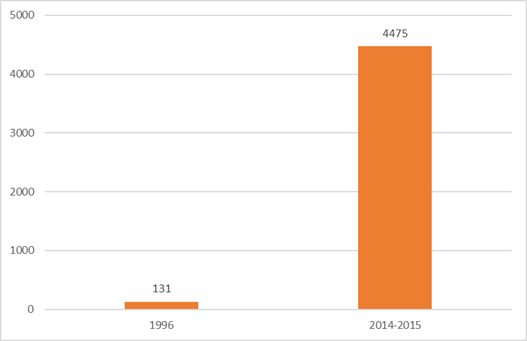
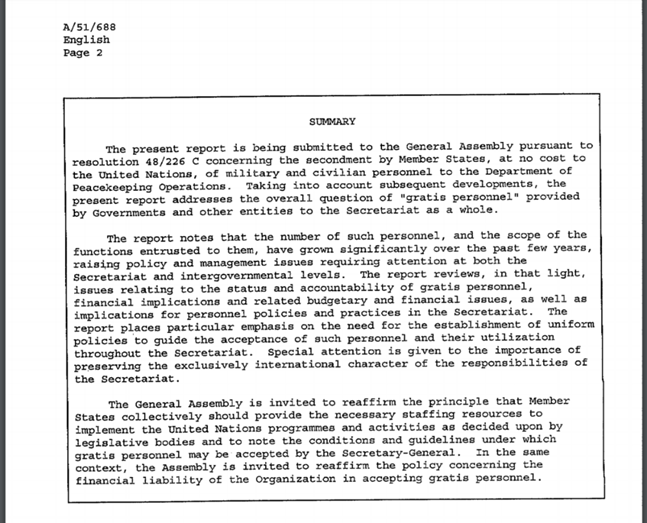
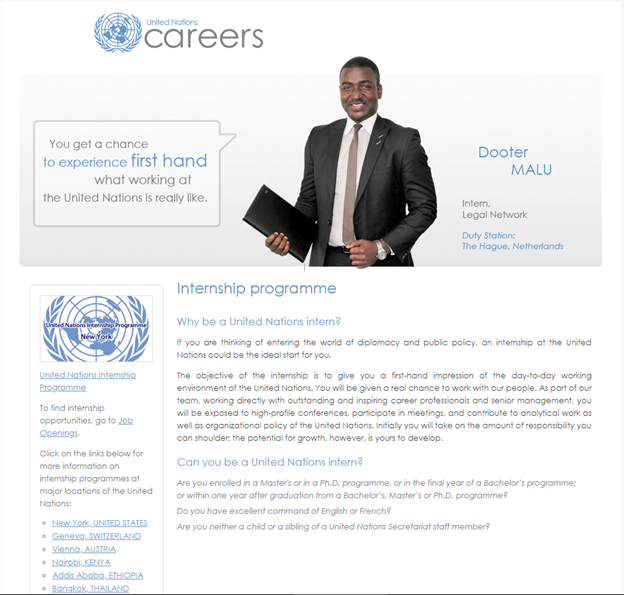
4 replies on “Ultimate Guide to United Nations Internships”
How to contact you Sir?
Dear Tanvi – you can always write me via our mailing list.
Thanks for the blog. Have an upcoming 6 month internship. Lets say (as I hope it does) – it goes amazing. Produce high quality work, have good relationships with colleagues, never late, dependable – the perfect employee and my manager loves me. At the end of such an experience, would you not advise speaking to the manager about potential future opportunities working with the organization (after the six month post internship period has passed and given that I would fulfill all the requirements of the desired P-2 position). Would love to know your thoughts. Thanks and keep up the good work.
Absolutely! It will be natural and expected that you will be interested in seeking paid work opportunities – like a full-time P2. Since you’ll be already with a foot in the door, focus on finding something totally different and unique to learn and get done. As you start, learn what the big gaps are in terms of work, ideas, strategies and so forth — and think of creative ways to fill those gaps, whether through research, your studies, networking and so on. This will give you an “above expectations” edge to make you really stand out when you make your ask. Let me know how it goes!